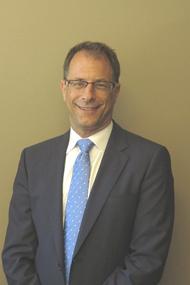Andrew Beja

- Classification
- Equity
- Company
- Granahan Investment Management
Andrew (“Drew”) Beja joined Granahan Investment Management at the end of 2011 as a Portfolio Manager. Drew has 29 years industry experience, primarily in the small and SMID cap sector of the market. He manages the GIMI Small Cap Focused Growth product that he conceived and started in 2007, as well as a portion of the Small Cap and SMID-Cap portfolios.?
From 2000 to 2011, Drew was with Lee Munder Capital Group in Boston, a firm he co-founded and where he managed several small and SMID cap growth equity products. In 2007, he started the Focused Growth product that he continues to manage at Granahan. Prior to Lee Munder, Drew was a portfolio manager with Standish, Ayer & Wood. Before moving to the buy-side, Drew was an equities analyst for Advest. Drew received his BA from Miami University. He holds the Chartered Financial Analyst designation and is a member of the CFA Institute and the Boston Security Analysts Society.?
- Investing in companies capable of sustaining 15%+ growth
- Focusing exclusively on companies operating in areas of the PM’s core competency
- Adhering to a disciplined risk/reward and expected return methodology, which encompasses understanding and quantifying downside risk

Our investment philosophy is rather straight-forward. Our team is deep and experienced both as investors and in terms of sector expertise. We devote a great deal of time getting to know companies in our areas of expertise that we believe are capable of sustaining strong growth for an extended period of time; that is, companies that can grow more than 15% annually for the next 5-7 years.
In addition to strong growth, we also require other characteristics for a company to be of interest ? companies must have large open-ended growth opportunities, sustainable competitive advantages, strong customer value propositions, exceptional management teams that couple vision and execution, and corporate cultures that can attract and retain talent. Last but not least, the companies typically have strong balance sheets and cash flow. While many investors like companies with these characteristics, we require them. At any given time, we monitor a list of about 100 companies with these sustainable growth characteristics. We refer to such companies as "Desert Island Companies;” that is, if we were stranded on a desert island for 5-7 years, these are companies that we’d take with us knowing they would be successful and much larger at the end of our time in seclusion.
The 100 or so companies on the Desert Island Monitor List are poised to grow significantly and should outpace the broad markets and economy in terms of expansion. However, there may be bumps along the way for any given company on the list ? a good company is not always a good stock. It is important to know when to own, and not own, the stock.
The Granahan Focused Growth portfolio is an actively managed subset of the Desert Island Monitored List. In constructing and managing the portfolio, we couple the company analysis just described with a disciplined securities analysis methodology centered on both the stock's risk/reward and expected return. We place particular emphasis on the downside, or risk-side, of the risk/reward equation. Our investment process also incorporates a number of systemic risk management elements, including exposures and correlations on several vectors. We believe this philosophy and process is one that can continue to generate good relative performance in both up and down markets, and more importantly, attractive returns for our clients over time.

I think the environment for the types of companies in which we invest is constructive. In a world where sustainable growth is quite scarce, we are finding no shortage of superbly positioned companies with very large opportunities. For instance, LinkedIn (LNKD) is in the early phases of usage and monetization of its dominant position as the global online network for professionals; Pandora (P) is an internet radio service that has quietly grabbed more than 8% of the entire U.S. radio market and yet only captures a fraction of that share in terms of revenue; Tesla Motors’ (TSLA), an auto maker formed less than 10 years ago, saw its Model S Electric Vehicle named Motor Trend's Car of the Year. We see many companies poised to capture significant shares of large markets and consider these companies for the Desert Island Monitored List. However, while viewing these opportunities with enthusiasm, you can be assured that we are steadfast in critically delineating between a company's opportunities and a stock's risk/reward; and we are very disciplined in exercising our investment process centered on the expected returns of the stocks of these companies.

I'm 50 years old and have been investing since I was very young. I grew up in the United States in the city of Columbus, Ohio. I was fortunate to witness, and also participate in a very small way as an investor, one of the great growth stock stories in U.S. retailing history. I was given a single share of stock in The Limited Stores for my 9th birthday ? I think the company had fewer than 5 stores at the time, and sales under $10 million. I saw the stock, and the tiny dividend that was paid, multiply many times over the ensuing years and I fell in love with investing. Today, known as L Brands, the company's revenue is in excess of $10 billion.
I feel very fortunate to be engaged in a job that I truly enjoy. I'm excited to go to work every day and think about investing all the time. This enthusiasm springs from both the day-to-day aspects of investing in exciting growth companies, the constant learning involved, as well as the knowledge that we are providing people with an important service. Ultimately, individuals and institutions are entrusting their assets with us ? assets for which they worked very hard. We take that responsibility quite seriously.

While we are not top-down or macro investors, I would say that the markets appear to be at an interesting crossroads. On the one hand, equities could be due for a correction given current valuations and appreciation, both year-to-date and over the past several years. In addition, macro uncertainties, including China's rate of economic growth and the depth and breadth of socio-economic unrest (e.g., Egypt, Syria, Turkey, and Brazil), could destabilize investor confidence and cause equity markets to correct.
On the other hand, there appears to be substantial weight in the bull case for US Small Cap Growth equities. First, the US economy, while not robust, is in fairly good shape amidst a world in which there appears to be a relative scarcity of growth. In addition, we believe many asset classes are facing structural challenges that can be summed up as too much capital chasing too little cumulative expected returns. Many of these asset classes (such as private equity, venture, long/short, emerging markets, fixed income) feel "crowded;” that is, the incremental asset allocation trade is more likely to be a sale rather than a purchase. US equities, and particularly US Small Caps, could find themselves benefitting from those trades.
We don't have a crystal ball. And absent such an elusive forecasting tool, we prefer ? as investment industry luminary Charles D. Ellis advised in his classic book Winning The Loser's Game ? not to play the loser's game. Rather, it is important to make sure asset allocation is consistent with one's investment policy. Within such policy, and irrespective of any "Great Rotation" into equities from fixed income or other asset class, we believe the Granahan Small Cap Focused Growth strategy can continue to generate good risk-adjusted returns as it has over the past 6 years in a wide variety of market environments.

I believe that being a successful investor requires great diligence and strong discipline ? diligence to develop a sound investment philosophy and process, and the discipline to stick to that process. I believe strongly in our investment philosophy and process, and that we can continue to generate good absolute and risk-adjusted returns for clients through a disciplined execution of this process.
Related to this is the concept of "Focus.” We think so highly of the word that we put it in the name of the fund. In any discipline, the probabilities of success go up when one focuses on what one can do well. And while understanding and focusing on one's core competencies is important, perhaps even more important is knowing what areas are outside one's expertise. We absolutely steer clear of investing outside our areas of expertise, be they sectors (commodities for example) or types of investments (i.e., cyclicals).

For us protecting client assets starts with investing in good companies. Yet it doesn't end there, because good companies don't necessarily make good stocks. We systemically spend a lot of time evaluating what might go wrong with our investment hypothesis, and gauging under each negative scenario how much a stock might go down. It sounds simple, but we like stocks in which the downside is limited, the upside large, and the probabilities are skewed in our favor. This is the basic concept of "expected return," which is at the heart of our disciplined securities analysis process. We also are very careful about portfolio construction, and we have built into our process important risk management elements at the portfolio level as well.

There are many classic investment books of which I am a fan. However, I’ll highlight a couple of contemporary books from which I have found great value. The first is Thinking, Fast and Slow by behavioral psychologist Daniel Kahneman, who won the Nobel Prize in Economics in 2002. The second is Anti-Fragile by Nassim Taleb, who also wrote Black Swan and Fooled By Randomness. I view Anti-Fragile as an important volume not only for investing but for many, many elements of life outside of finance. Incidentally, Kahneman agrees, saying "It changed the way I look at the world."

I enjoy reading a wide range of perspectives. Beyond the New York Times, Wall Street Journal, Barron's and other traditional sources, my reading ranges from various magazines (Fast Company, Rolling Stone, The Economist, Food & Wine), to folks I follow on Twitter and LinkedIn (e.g., Richard Branson, Michael Bloomberg, and Tesla's Elon Musk), to websites and blogs covering start-ups, venture and an eclectic range of things (e.g., TechCrunch, Ted.com).
Notes:
This article originally appeared on September 24, 2013. Any views presented in this article are as of such date and are subject to change.
This article and the information provided therein are not a recommendation to purchase or sell any security, nor are they intended to constitute the marketing of, or a solicitation for investment in, any investment product. - See more at: http://www.investmentinjapan.com/interviews/orbis#sthash.TaSb5wNZ.dpuf
ranahan Investment Management is an independent, 100% employee-owned firm that was founded in 1985 by investment professionals with a passion for small capitalization equity investing. The three founding principals, Jack Granahan, Gary Hatton and Jane White, remain committed to the smaller cap area of the market and have dedicated their investment expertise to serving institutional plan sponsors and family offices. Granahan Investment Management (GIMI) believes that earnings drive stock prices, and that small dynamic companies with exceptional growth prospects provide the greatest potential for superior long-term performance. Over time, active management of the smaller cap sector has outperformed a passive approach. GIMI believes this is because the smaller cap area of the market is not as well followed by the investment banking community; therefore, opportunities to “discover” companies when they are not fully valued are more abundant. A bottom-up, fundamental approach to research is the only method that can both uncover and appropriately value stocks in the small cap arena.?
The firm has grown to over $3 billion in assets under management and the investment team has grown accordingly, now totaling ten professionals. The firm maintains its focused, dedicated and consistent approach to investing, highlighting an investment process that has been honed and proven for over 28 years.?
The Granahan Small Cap Focused Growth strategy invests in companies using a bottom-up approach to research and analysis, and combines this with a strict risk/reward and expected return discipline for selecting stocks and managing the portfolio. The portfolio holds approximately 40 stocks of some of the most exciting and innovative companies in the economy. The strategy for Focused Growth, and the consistent risk-adjusted returns for this product, can be summarized by:?
The Focused Growth product was born out of the portfolio manager’s experience and belief that the best way to add value for clients is to focus exclusively on areas of core competency ? a belief equally held at GIMI since inception of the firm. The strategy has a focus on companies with market capitalizations between $200M and $2Bn in the portfolio manager’s areas of expertise: Consumer, Technology Services, Internet and Business Services.?

September 24, 2013
by Investment in Japan

